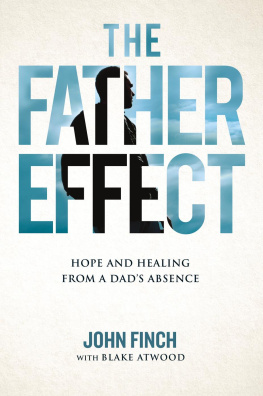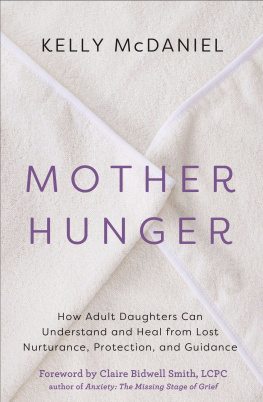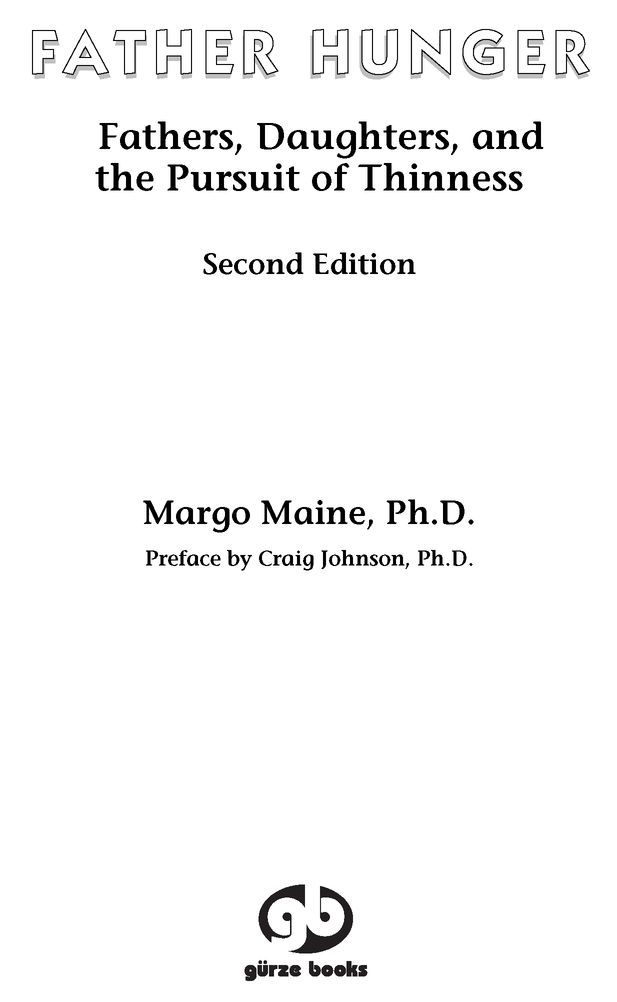Table of Contents
Acknowledgments
I am one of the fortunate few who escaped the experience of father hunger. My dad was available, affirming, and affectionate. He invited me into his world, but shared equally in mine and in the familys life. My mother supported and encouraged his involvement. I thank them both and dedicate this book in memory of them.
I also thank my husband, George Coppolo, for his endless patience and understanding when this project took precedence over our lives. His constant support has been essential to my accomplishing this and so many other goals. I am blessed with wonderful family, friends, and colleagues, and thank them for their presence in my life.
The support provided by Marianna Nelson, Research Coordinator at Newington Childrens Hospital, now known as Connecticut Childrens Medical Center, was priceless as I was writing the original text. Her editing, word processing, and understanding of the concepts I hoped to communicate in Father Hunger were invaluable. Matt Sawyers, another gifted editor, writer, and trusted resource, assisted my work in this newly revised edition. I am grateful to both of them.
The opportunity to work with Grze Books has also been a great gift. I deeply appreciate the conceptual contributions provided by Lindsey Hall and Leigh Cohn, and the editorial assistance provided by Diane Chalfant, MFT. I thank them for their commitment to educating the public about eating disorders and their persistence and encouragement as my raw notions about father hunger evolved into a meaningful theory.
Finally, I thank the young women and their families who have let me into their lives and taught me so much. I hope this book enhances your healing.
Preface
by Craig Johnson, Ph.D.
Most experts agree that eating disorders are caused by an interplay of biogenetic, psychological, and sociocultural factors. Psychologically oriented theorists have hypothesized that those most at risk for developing problems with food and body image have had disappointing or traumatic relationships with people close to them.
This emphasis on relationship disappointment is the focus of Dr. Margo Maines work. Previous explorations of this issue have concentrated almost exclusively on difficulties in the mother-daughter relationship, making many mothers feel that they were solely responsible for their daughters problems. Refreshingly, this author shifts the lens to the importance of the fathers role in the emotional development of a daughter.
Dr. Maine coined the phrase father hunger to describe the natural longing of children for their fathers, which, when unfulfilled, can lead to a variety of problems. In this book she examines how multigenerational and sociocultural factors have resulted in fathers becoming not only physically but also emotionally disconnected from their families, and how this distance affects girls development of sexuality, body image, self-esteem, and identity.
Throughout the book, Dr. Maine translates sophisticated and difficult psychological theories into language that is understandable to the lay reader. She avoids father bashing by offering evenhanded explanations of the differences between social expectations for men and those for women, and how these affect our psychological development. One of the most serious effects is that modern societys prescribed roles cause men to have difficulty with emotional expression and nurturing skills, while women become increasingly isolated in the duties and responsibilities of parenting and caretaking.
I believe the success of a book is often determined by its appearing at the right time with the right information. Unquestionably, the time is right for a book that focuses on the importance of fathers as primary caretakers and as one of the most important men in a womans life, In truth, it is frightening that books with such a premise are only now appearing.
This book also presents the right information. Dr. Maine has done a masterful job of integrating sociocultural influences, developmental data, and systems theory into a comprehensive and readable explanation of the ways in which impaired father-daughter relationships can increase the likelihood of a young woman developing problems with food, weight, and body image.
She then offers specific recommendations for how to repair the father-daughter relationship. She speaks to fathers directly, conveying changes they need to make, and explains what mothers can do to improve family relationships and assist in a daughters recovery. Dr. Maine offers solid advice that is both challenging and accessible to all family members.
I wrote the previous ideas in 1991 for the preface of the first edition of Father Hunger. At that time I emphasized that the field had neglected the important role fathers should play in their daughters development and recovery. So, has anything changed in the last decade and a half? Yes.
Professional treatment programs and consumer organizations are leading the way. For example, my eating disorders program at Laureate Psychiatric Hospital has conducted a family week for the past seven years. During the first week of every month, family members are invited to come to the center for a combination of education and intensive family intervention. They can attend as many family weeks as they want, and a concerted effort has been made to engage fathers. Last year more fathers than mothers attended and reported a very high level of satisfaction with their involvement in their daughters treatment. This is a treatment trend throughout the field. Another sign is that fathers whose children have experienced eating disorders now make up half of the nonclinical board members of the National Eating Disorders Association compared to only one member when the original edition of this book was released. In fact, the relatively new nonprofit association, Dads and Daughters has adopted many of Margos ideas in its approach to preventing eating disorders and body image problems. Clearly we have made progress, and I am confident that this newly revised edition of Father Hunger will accelerate the change.
This edition introduces a new focus on the crushing pressures being placed on todays contemporary girls by the global economy and worldwide media to live up to a painfully unrealistic body image that emphasizes slenderness beyond reason. For many girls, this extreme emphasis on thinness or appearance mistakenly becomes their main purpose, overshadowing the sense of value and worth that is their birth-right and that would otherwise be cemented into place through developing their skills and making a contribution to the world. In this sense, our global culture has become a dysfunctional one that damages both women and men. Only an enlightened perspective can empower girls and women to rise above the cultural pressures and claim their own individuality. Fathers need to be part of this enlightened perspective.
Dr. Maines other revisions have improved and expanded the original message that daughters need their fathers, fathers need their daughters, and wives need a vital working partnership with their husbands to help raise healthy women.
Craig Johnson, Ph.D., is Director of the Eating Disorders Program at Laureate Psychiatric Clinic and Hospital in Tulsa, Oklahoma. He is author of The Etiology and Treatment of Bulimia Nervosa










